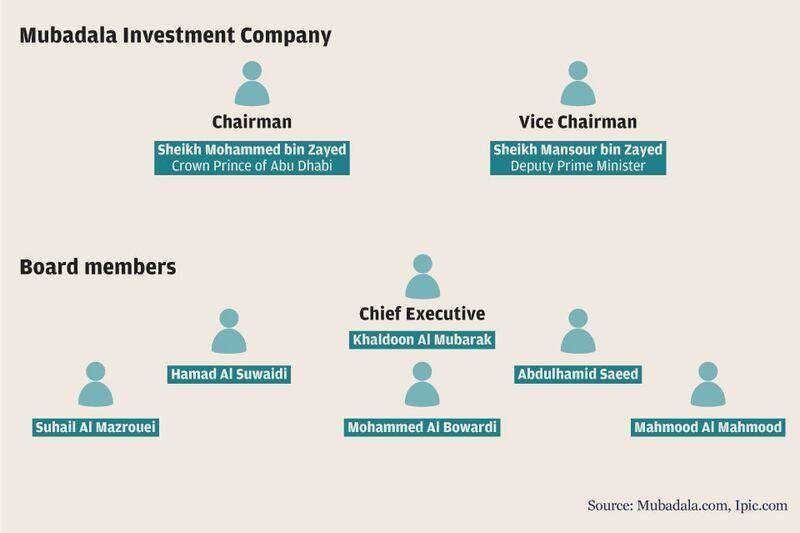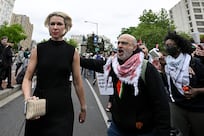__________
[ Update: Mubadala Investment Company has announced its new divisions and their leaders ]
__________
Mubadala Investment Company, the sprawling strategic development company created by the merger of Mubadala Development and International Petroleum Investment Compay (Ipic), will take the next step in its integration path when it announces, as early as today, the top executive layer below its board.
The merged company’s board was announced last month, with Sheikh Mohammed bin Zayed, Crown Prince of Abu Dhabi and Deputy Supreme Commander of the Armed Forces, as the chairman and Sheikh Mansour bin Zayed as the vice chairman. Khaldoon Al Mubarak is the group chief executive.
But the new layer of divisional chiefs will be the first clear indication of how the company, with combined assets of about US$122 billion as of last June, will reorganise itself for future growth and development.
The structure and portfolio of the two legacy companies was defined by their history of diverse missions and mandates, which resulted in a fair amount of overlap between the two, as well as some investments in search of a rationale to fit within the broad objectives of fostering strategically important industries and infrastructure.
It seems clear, however, that after months of poring over the organisation since the merger was first announced last summer, the group’s leadership, with the help of consultants from Bain & Co, are seeing the company’s strategy in terms of three main pillars which have, to varying degrees, compelling strategic rationales :

Borealis is one of the new entity’s market leaders. Qilai Shen for The National
Energy
This is the most clear-cut grouping, with the combined energy portfolio of Mubadala and Ipic accounting for more than a third of group assets, and in the latest six-month period for producing 75 per cent of combined revenue and most of the profit.
Ipic’s managing director, Suhail Al Mazrouei, who is also the chairman of Mubadala Petroleum and the UAE’s Energy Minister, will sit on the board of Mubadala Investment Company and said in November, when setting out the vision for the new group, that it made strategic sense to combine all the energy assets under one umbrella.
“We see a natural hedging between the investment across the value chain,” he said. “If you want to be involved in the full value chain like an integrated oil and gas company – and you can look across the board at most of those companies – they are investing in the upstream, gas and power, and even renewables, and then you look downstream at petrochemicals.”

The combined energy group will have a wider upstream portfolio, with Mubadala’s Asia concentration, and – from the Ipic side – Cepsa’s Latin America focus and OMV’s eastern Europe and central Asia interests combining.
The larger integrated assets of the group also gives it more heft to pursue its – and Abu Dhabi’s – most important strategic industrial objective: to establish itself as a world-class player in key downstream areas, especially petrochemicals. Already, in Borealis and Nova Chemicals, it has market leaders in their segments and it has deepening partnerships with the state oil company, Abu Dhabi National Oil Co, to extract more value and potentially foster industry clusters even further downstream, in plastics, for example.
The key question for this group will be whether it includes all of its renewable energy and international power together, as Mr Al Mazrouei indicated, and if so how it will integrated as part of the overall strategy.

Ipic contributes Cepsa’s Latin America focus to the new company’s upstream portfolio. Desiree Martin / AFP
Industry And Infrastructure
The core of the legacy Mubadala Development mission was to foster nascent industries and fund and develop Abu Dhabi – and to a small extent, international – infrastructure.
On the industry front, this has focused on “knowledge” industries, such as some information and communications technology business segments, and particularly leveraging Abu Dhabi’s buying power to establish a foothold in aerospace (and defence through its majority share in Edic).
One of the key questions here is what will happen to GlobalFoundries, the wholly-owned subsidiary that is a major part of the portfolio and lately has been substantially loss-making. The company is one of the world’s largest silicon chip makers – for clients such as Apple. Mubadala’s spokesman has said that it remains committed to the company, but some have questioned its strategic value since it was acquired in 2009.
Last week, GlobalFoundries announced plans to expand its global manufacturing footprint in response to growing consumer demand. The company is investing in its existing leading-edge fabrication plants in the US and Germany, expanding its footprint in China with a plant in Chengdu, and adding a capacity for mainstream technologies in Singapore.
Another strategic question for Mubadala Investment Company is what other industries it might be interested in fostering. The UAE’s economic mission statement is to nurture industrial clusters, so the new entity might be interested in opportunities in advanced materials, which leverages its assets in both the petrochemicals and aero parts manufacturing businesses. There could also be opportunities in medical and biotechnology fields to cluster around the nascent healthcare sector.
Infrastructure and real estate were combined in the legacy Mubadala company, which included segments such as the development of Al Maryah Island and Global Market Square, which Abu Dhabi is developing to be one of the region’s financial services hubs. It includes hotels in that development, namely The Rosewood and Four Seasons, as well as the Viceroy Group of hotels. It also contains public private partnership projects, including various universities such as the Paris-Sorbonne Abu Dhabi on Reem Island.
A key question for the merged company is how Aabar Properties might be combined with Mubadala’s real estate portfolio. Also, though Ipic recognised its 35 per cent in Arabtec as a controlling holding, the new company is likely to treat it as an investment.

Strata is one of Mubadala Investment Company’s industrial assets in the UAE. Courtesy Strata
Capital Investments
This is the part of the new group that will define the companies’ role in financial services, including strategic government-to-government investment projects, but also in sorting out a very disparate and challenging legacy portfolio.
A key question is what the new company chooses as its private equity platform. Already, rumours have swirled about a multibillion-dollar tie up with Ardian, a French investment firm, and SoftBank, Masayoshi Son’s technology investment outfit. The standard answer to date from Mubadala spokesman Brian Lott has been: “Mubadala is still in discussions with a number of world-class investment firms to create an investment vehicle for private equity deals”.
Of growing importance will be the new group’s strategic national investments, such as its $2bn co-investment fund with Russian Direct Investment Fund, the Qatar Abu Dhabi Investment Co, Falah Growth Fund with Kazakhstan, and others. These should not be seen in isolation, company executives say, but as part of broader country-level strategies where, for example, Abu Dhabi is seeking co-investment such as on energy projects and food sector deals in Russia.
One of the most challenging questions for this part of the new organisation will be how to deal with troublesome non-strategic investments, particularly from Aabar Investments. This includes the investment in the Italian lender Unicredit, which was written down in the latest accounts by $1bn to about $680 million, with this position serving as collateral against more than €2bn (Dh7.75bn) of Aabar bonds due between 2020 and 2022.
amcauley@thenational.ae
Follow The National's Business section on Twitter





